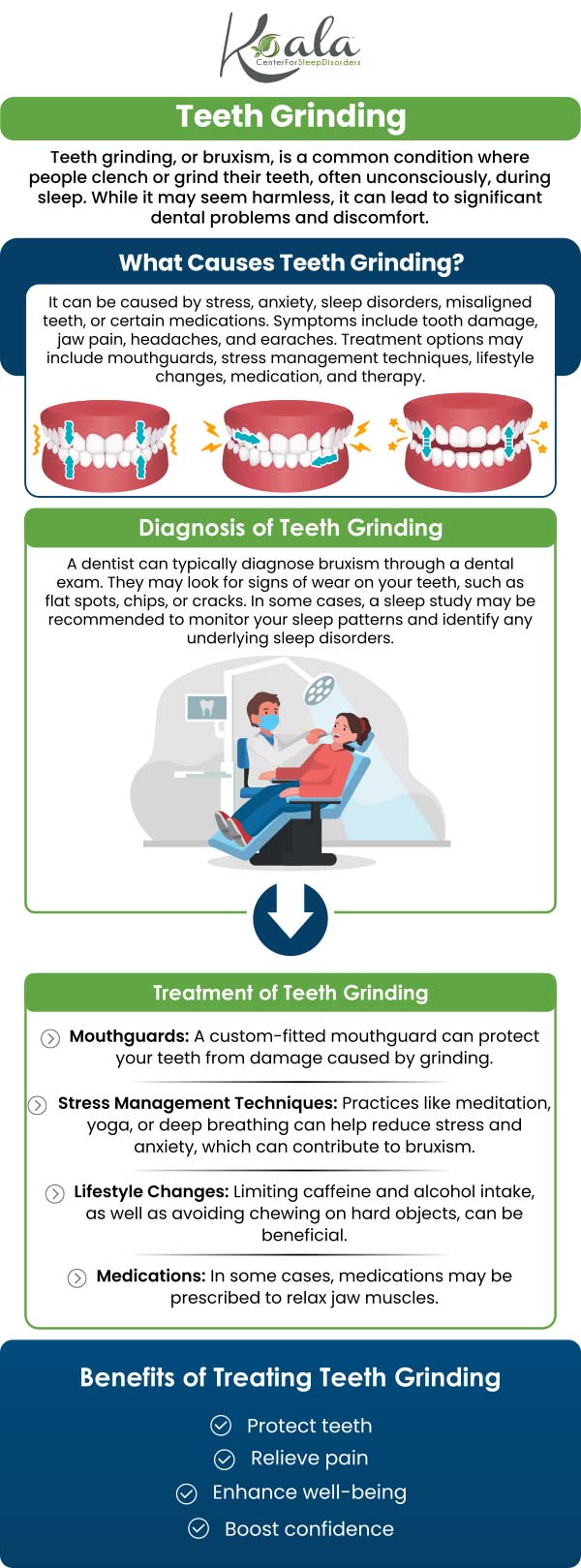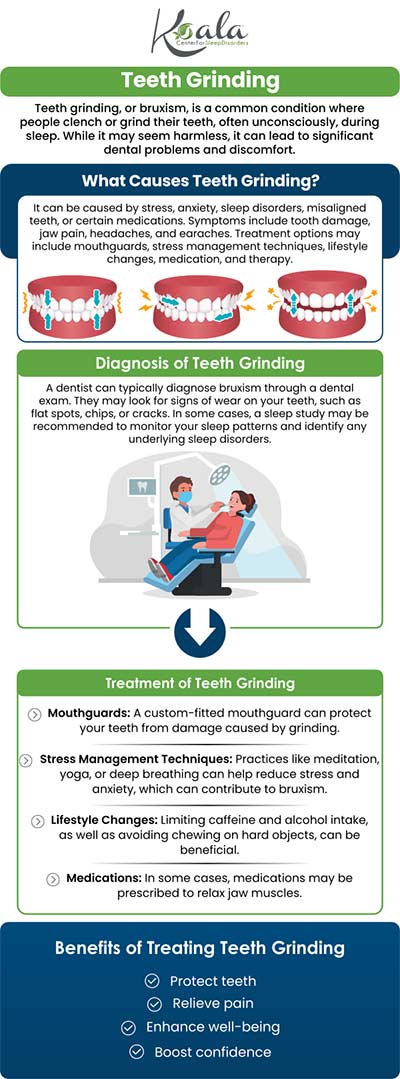Bruxism (Teeth Grinding) – Symptoms and Causes
Bruxism is a condition that is characterized by the subconscious grinding or clenching of the teeth and jaw. There are a variety of causes for this condition, including stress and anxiety, sleeping disorders, and certain medications. If you or someone you know is suffering from bruxism, come to Koala® Center For Sleep & TMJ Disorders and talk to our providers. For more information, call us or visit us online to book an appointment. We have convenient locations across the U.S. in Bloomington IL, Peoria/Dunlap IL, El Paso TX, and Wausau WI.




Table of Contents:
What disease causes teeth grinding?
How do I stop grinding my teeth?
Can grinding teeth be cured?
When should I be worried about grinding my teeth?
It is a common issue that affects many individuals and can have serious consequences if left untreated. It is important to consult with a doctor to explore potential treatments for bruxism and make sure that serious dental problems do not occur down the line.
The current medical understanding of the etiology of bruxism is not well developed, and there are many more questions remaining about what causes teeth grinding. However, there appears to be a hereditary component, meaning that teeth grinding can be passed down genetically from parent to child. Other common causes include:
– Stress — The number-one cause of jaw clenching and teeth grinding is stress, which often causes people to subconsciously grate their teeth. This can occur both while asleep and while awake, but may be more prominent at night for some people.
– Neurotransmitter Imbalance — Some research shows a correlation between teeth grinding and an imbalance of neurotransmitters, which may play a role in the condition.
– Dietary Triggers — Diet is also an important factor in teeth grinding, with evidence of vitamin deficiencies contributing to bruxism, such as vitamin D and calcium deficiency.
Bruxism is the medical term used to describe the involuntary grinding of one’s teeth. It is a common oral condition that affects both adults and children, and can result in jaw pain, headaches, damaged teeth, and other dental issues. In extreme cases, bruxism can lead to TMJ disorder, which can cause significant pain and discomfort in the jaw joints and surrounding muscles. It is important for individuals to recognize the early warning signs of bruxism so they can seek treatment to prevent any further damage or pain.
Bruxism is a condition in which a person grinds or clenches their teeth involuntarily. It is believed to be an underdiagnosed disorders and is estimated to affect 8 to 31% of the population. In some cases, bruxism is mild and goes unnoticed, but in more severe cases it can lead to headaches, jaw pain, tooth sensitivity, and tooth loss. This condition can be caused by stress, sleep disturbances, or malocclusion.
Although childhood bruxism is quite common, most children grow out of the habit before they reach adolescence. However, as with any issue you are concerned with, please reach out to our team, who can answer all your questions at Koala® Center for Sleep & TMJ Disorders.
Furthermore, there are some signs and symptoms you should be aware of that indicate teeth grinding may require further evaluation:
– Experiencing problems sleeping throughout the night
– Jaw pain or soreness
– Headaches
– Tooth sensitivity/pain not caused by other dental issues
– Teeth begin showing signs of wear
– Damage to the soft tissues of the mouth, such as the gums
– Loud, persistent grinding that does not improve with time
If you or someone you love is grinding their teeth, the dedicated sleep team at Koala® Center For Sleep & TMJ Disorders can help you find relief and prevent further complications. With our seven US locations, we serve patients from all across the country: we have a clinic in El Paso, TX; one in Wausau, WI; one in Mishawaka, IN; one in Bloomington, IL; and one in Peoria – Dunlap, IL. Schedule an appointment at any of our locations today to receive high quality care from top-rated TMJ disorder specialists. We look forward to serving you!

Additional Services You May Need
▸ KoalaKIDZzz®
▸ Sleep Apnea
▸ Snoring
▸ TMJ Disorder
▸ Fatigue
▸ Sleep Disorders
▸ Weight Loss
▸ CPAP Alternative
▸ Oral Appliances




